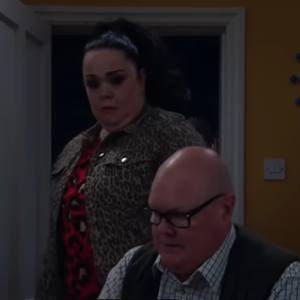The Brewing Storm Behind the Scenes: Emmerdale and Coronation Street Merger Rumors Ignite Fierce Debate
The tranquil worlds of Britain’s most beloved soap operas, Emmerdale and Coronation Street, have been suddenly thrust into the eye of a storm this week as wild rumors surfaced about a potential merger between the two iconic shows. Across the nation, fans and industry insiders alike were set ablaze with speculation that the long-standing distinct identities of these two dramas might merge production under one roof — a seismic shift that could forever change the face of British television drama. What began as whispers has escalated into headline news, igniting fierce debate and a wave of anxious anticipation among viewers who cherish the unique spirit and cultural significance of each show. The prospect of consolidation, rumored to be driven by cost-cutting measures, threatens the soul of two very different communities: one rooted deeply in the industrial grit of Manchester, the other in the pastoral beauty of Yorkshire’s Dales. How could such a drastic transformation impact the stories, characters, and rich traditions that have been carefully nurtured over decades?
At the heart of the controversy is a provocative statement made by Peter Fincham, former Director of Television for ITV, who stirred the pot by suggesting that Emmerdale could potentially move away from its traditional Yorkshire setting to be filmed closer to Coronation Street’s established Manchester base. Fincham’s hypothetical vision painted a picture of a dramatic overhaul where both productions operate “under one umbrella” in the bustling media hub of Salford, promising “big savings” on production costs. This tantalizing possibility sent shockwaves through the fanbases, with social media exploding in a mixture of outrage, nostalgia, and fear for the future. Longtime fans of Emmerdale expressed dismay at the idea of disconnecting the show from its Yorkshire roots — a fundamental element of its identity — while supporters of Coronation Street worried that the show’s own integrity might be diluted in a merged production environment. The emotional stakes are high because these are not just television shows; they are cultural icons that reflect the lives, struggles, and triumphs of real communities across Northern England.
Yet, as the rumors gained traction, ITV hastened to quash the swirling speculation with an official response that unequivocally denied any plans to merge the productions. ITV emphasized that Emmerdale and Coronation Street would continue to be produced independently, maintaining their unique settings in Leeds and Manchester respectively. A spokesperson underlined that “it’s pure speculation” to suggest otherwise and reaffirmed the network’s commitment to the distinctiveness that has made both dramas enduring pillars of British television. This public denial brought some calm but also left an air of mystery hanging over the discussions. Why would such a concrete statement be necessary if the rumors were so baseless? Was this simply a preemptive strike to quell unrest, or is there some truth lurking beneath the surface, simmering just out of sight? The drama on screen may be fictional, but behind the scenes, the unfolding debate raises critical questions about the future direction of UK soap operas amid financial pressures and changing viewer habits.
Beyond the raw shock of the rumors and official denials, this controversy exposes deeper tensions within the broadcasting world. The delicate balancing act between preserving beloved traditions and innovating to adapt to rapidly evolving markets is never easy. Cost-cutting measures are an ever-present reality, especially in an era where streaming services and digital content have transformed audience behaviors. ITV faces the difficult challenge of ensuring that production remains financially sustainable while keeping loyal audiences engaged. Fincham’s suggestion, while provocative, actually taps into a broader industry conversation about consolidation and efficiency that many networks are grappling with globally. Yet, viewers’ passionate reactions underscore that these dramas are far more than productions; they are woven into the fabric of Northern English life, community, and identity. Any changes risk unsettling this deep connection and alienating viewers who depend on these familiar narratives for comfort and escapism in challenging times.
In the end, this unfolding drama surrounding the potential merger of Emmerdale and Coronation Street is a story about much more than television logistics. It is about the fight to protect legacy and authenticity in an industry facing seismic disruption, about the fears sparked when treasured pillars appear under threat, and about the need for networks to listen deeply to the voices of their communities. For now, viewers can breathe a sigh of relief knowing their favorite dramas remain safely anchored in their respective homes — the rolling hills of Yorkshire for Emmerdale and the urban heartbeat of Manchester for Coronation Street. But the drama behind the scenes continues, a compelling saga in its own right that reminds us the stories we watch on screen are but one layer of the rich, often turbulent world of television storytelling.





